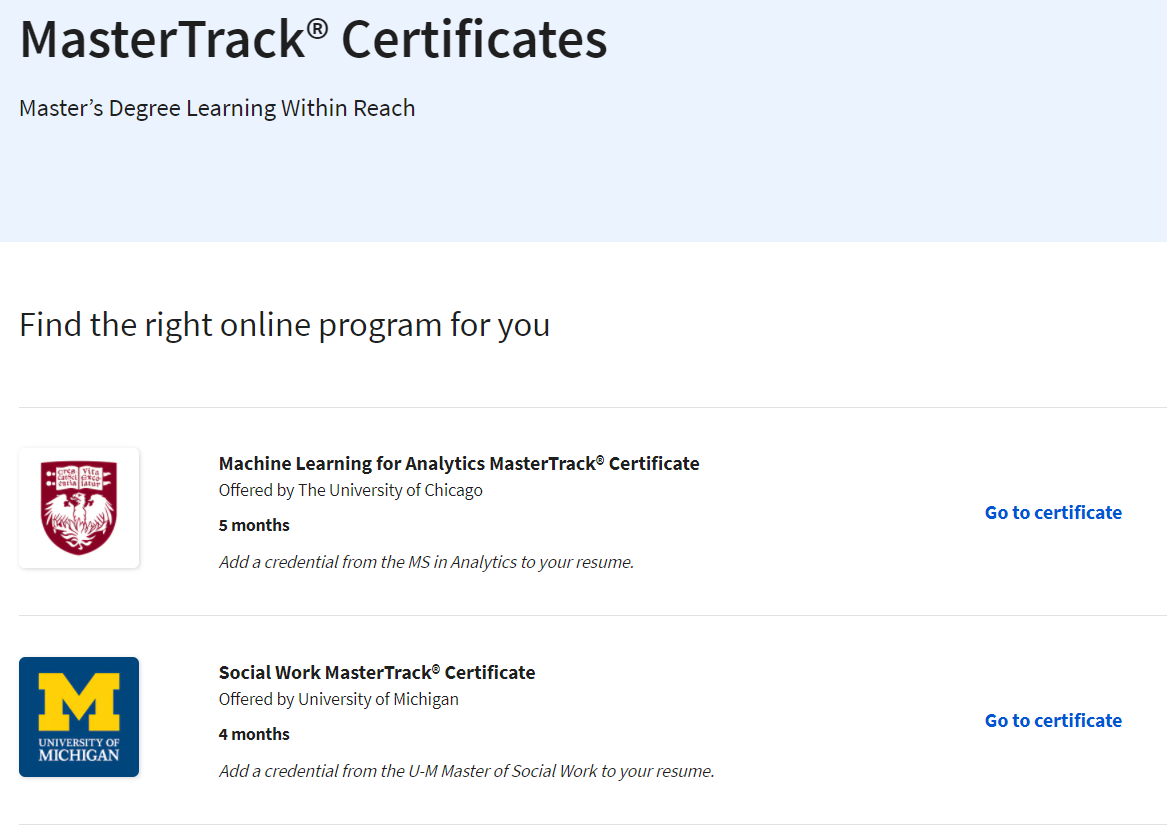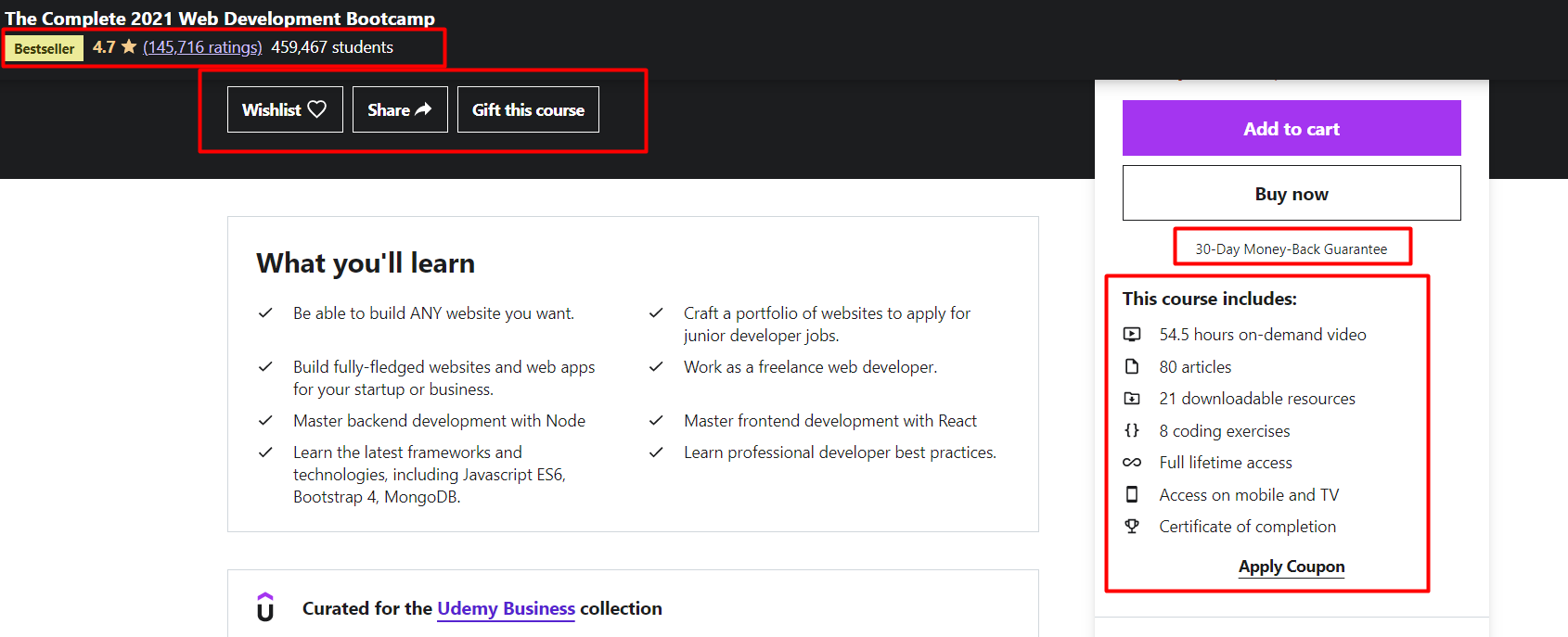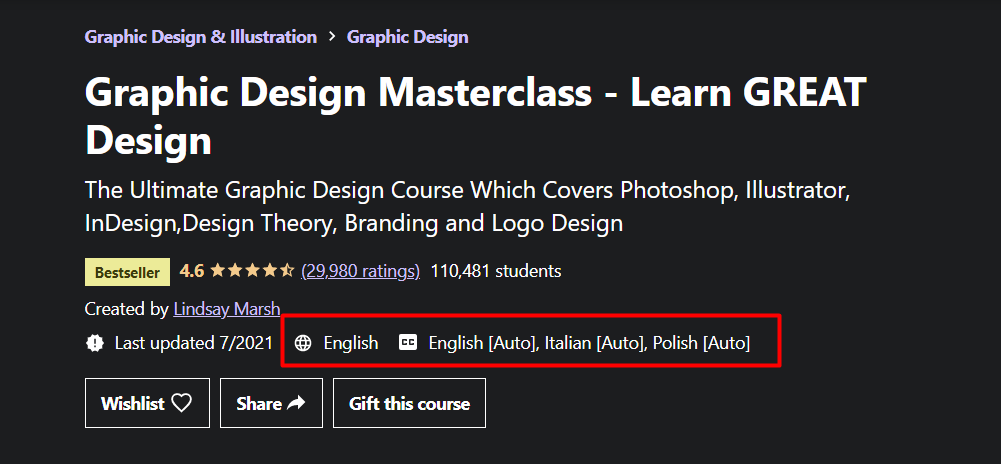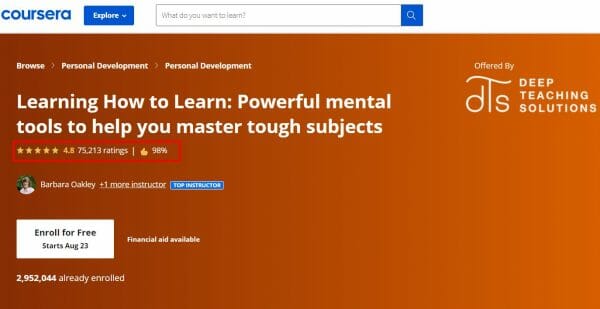With the world increasingly relying on digital technology, it’s no surprise that more and more people are starting to take an interest in coding and programming. Many of these people are also looking to technology to teach them, using online learning platforms rather than traditional in-person courses or degrees to learn how to code.
Two of the biggest of these online learning platforms are Udemy and Coursera. Both platforms have unique advantages and disadvantages in terms of price, course quality, opportunities for professional development, and more, which can make it hard to choose the right one for you.
If you’re trying to decide what your best option is for learning to code online, this guide will break down how Udemy vs. Coursera stack up against each other in a variety of categories to help you make a more informed decision.
Udemy vs Coursera: Course Variety
One of the most important factors in choosing the right learning platform is how wide a range of online courses they provide. With that in mind, let’s look at the variety of courses that Udemy and Coursera provide.
Udemy
Udemy course variety is one of its biggest selling points. Just about anyone can create a course on Udemy, leading to an absolutely staggering number of different online courses to choose from.

One of the major advantages of Udemy’s model is that since there are often multiple different course instructors offering courses on the same subjects, learners have more options available to find a teaching style that suits them. However, the choice can sometimes be a little overwhelming – so make sure to go in with a good idea of exactly which subjects you want to learn.
Coursera
Coursera also offers a wide variety of courses to choose from. There are over 1200 different courses available across their IT, computer science, and data science categories, offering learners the opportunity to study a wide range of subjects.
These online classes range from short guided projects to longer courses, and even online degree courses. Because of this, Coursera caters to a wide range of learning goals.
Verdict
While Coursera’s variety of courses is definitely not to be sniffed at, Udemy is the clear winner when it comes to the range of courses on offer. The fact that anyone can make a course on Udemy means that there’s an incredible amount of courses to choose from, and new ones are constantly being added.
Udemy vs Coursera: Course Quality
It’s not just the quantity of courses on offer that matters – the quality of the courses that Udemy and Coursera provide is also an important consideration. So how do the two platforms compare?
Udemy
Udemy course quality is highly variable. Just about anyone can make an online course on Udemy, and since instructors aren’t vetted particularly strongly, there’s no guarantee that those courses will actually be any good.
That’s not to say there aren’t some truly excellent courses to be found on Udemy, of course – but it does mean that to find the best ones you may have to sort through a lot of lower-quality courses first.
Coursera
Coursera offers consistently high-quality courses thanks to its partnerships with leading, prestigious universities, educational institutions in general, companies, and organizations in the industry. Some of its most prominent partners include Google, Stanford, and IBM.

These partnerships ensure that all Coursera courses receive input from experienced professionals to provide valuable insights and guidance. Courses are also made to high production standards, resulting in very polished presentation as well as quality content.
Verdict
While Udemy wins on quantity, Coursera takes the crown for quality. While there are definitely a number of excellent courses to be found on Udemy, Coursera is much more consistent in delivering high-quality courses made in collaboration with experienced professionals.
Udemy vs Coursera: Prices
For the budget-conscious learner, one of the major factors in finding the right learning platform is affordability. So which offers better value for money: Udemy or Coursera?
Udemy
Courses on Udemy range from $10-100, with prices set by individual instructors. There are also a wide variety of free courses available, although these may be missing features like completion certificates and instructor Q&As.
What’s more, once you pay for a course on Udemy, you have lifetime access to its contents, meaning you won’t have to pay any costly monthly subscriptions. There’s also a 30-day money-back guarantee, meaning you don’t risk wasting your money if a course doesn’t meet your expectations.
Coursera
Prices vary widely across Coursera courses – individual courses start at $29-99, while online degrees cost anywhere from $9,000-25,000. There’s also the Coursera Plus subscription, offering access to all their courses except for MasterTrack courses, certain certificates, and degrees for only $59 a month.

Coursera also offers nearly 2000 free courses across all its subject categories (although again, these don’t provide features like graded assessments or certificates). However, pricing options can often be quite confusing for paid courses because of the many different options given for each course.
Verdict
Coursera and Udemy are on a fairly even footing when it comes to pricing, so it largely comes down to what you’re looking for. If you’re looking to fit in only a couple of courses each month, Udemy may be the better option.
Coursera, meanwhile, is better for going all-in on major certificates or degrees, or for accessing unlimited smaller courses each month via Coursera Plus.
Udemy vs Coursera: Course Updates
One of the factors that’s often overlooked when choosing an online learning platform is how well they keep their courses updated in order to ensure they keep up with new developments and trends in the industry. Here’s how Udemy and Coursera handle course updates.
Udemy
Udemy allows its instructors to update their courses whenever they want to keep them current and relevant, make corrections, or add new material – but there’s no guarantee that instructors actually will update their courses.

On the other hand, the rate at which new Udemy courses emerge means that even if instructors don’t update old courses, there’s usually a good chance that new courses will cover recent developments instead.
Coursera
Because of their collaborations with universities and professional partners, courses are usually kept highly up-to-date and in line with industry trends. Working with industry leaders in creating courses means that Coursera can take advantage of specialist insights to create courses that are highly modernized and relevant.
However, making courses dependent on these partnerships can also slow down Coursera’s response to problems with courses since the terms of their collaboration may necessitate making changes through the partner organization instead of doing it themselves.
Verdict
Coursera comes out on top when it comes to course updates thanks to its greater reliability and consistency. Udemy does offer up-to-date, modern courses, but leaving updates up to course instructors is a much less reliable system for keeping courses updated.
Udemy vs Coursera: User-Friendliness
It’s just as important to look at how a platform works as it is to know what it provides. Knowing what a platform does to make the user experience as pleasant as possible is vital to making the right choice – so let’s look at how Udemy and Coursera compare.
Udemy
Udemy’s huge variety of courses is a win for user-friendliness, as it caters to a variety of different learning styles and experience levels. On the other hand, the sheer amount of courses on offer can lead to an overwhelming choice, so it’s best to have a clear idea of what you want to study before starting.

If you’re looking for flexibility and the ability to learn on the go, Udemy has you covered. Their mobile app provides offline playback, allowing you to study wherever you are, and lifetime access to courses you’ve paid for means there’s no time pressure to complete them – just work to your own schedule.
Coursera
Coursera has its own mobile app on both iOS and Android, plus a mobile responsive website, allowing learners to study on the go. However, it’s less beginner-friendly than Udemy, as many courses require or assume prior knowledge of the subject to some extent.
There’s also a certain amount of time pressure for completing courses – individual courses come with a 180-day time limit, while “specialization” course bundles require a monthly subscription to maintain access. This means there’s more pressure to complete courses quickly to keep costs down, rather than working to your own pace and schedule.
Verdict
Udemy just edges it in this category since lifetime access to courses can be a real benefit to budget-conscious learners and users who require a more flexible studying schedule. It’s also easier to get into for beginners, as its range of courses caters to more experience levels.
Udemy vs Coursera: Accessibility
Not everyone has the same needs when it comes to learning, so how well a learning platform caters to different accessibility needs – such as additional languages, different course formats, and navigation aids – is an important consideration. Let’s take a look at how Udemy and Coursera compare when it comes to accessibility.
Udemy
As with most factors, Udemy leaves accessibility measures up to individual instructors to implement. Some instructors may offer courses in additional languages other than English; others may provide closed captions to help learners with hearing impairments (although these are often auto-generated and not necessarily 100% accurate).

However, there’s no set requirement for instructors to include these measures, so the sad truth is that many simply don’t bother. Moreover, many courses are designed as video-only formats, which isn’t ideal for users who struggle to see or hear videos.
Coursera
Coursera takes accessibility fairly seriously. Many courses are offered in multiple languages, allowing non-English speakers to make use of them. Coursera also makes good use of closed captions and translated subtitles for video lectures.
Their site also states that it follows Web Content Accessibility Guidelines, and they have a dedicated accessibility team focused on making continuous improvements and meeting new requirements as necessary.
Verdict
Coursera has a much stronger commitment to accessibility than Udemy, taking steps to make many of their courses very accessible to learners with different needs. Udemy may offer some accessible courses, but without enforcing any major accessibility requirements for instructors, there’s no guarantee of finding a course that meets your needs.
Udemy vs Coursera: Course Reviews
Course reviews are a useful tool for deciding whether a course is the right one for you, and whether it meets high standards of teaching. Both Udemy and Coursera make use of course reviews, but who does it better?
Udemy

Users can leave reviews on Udemy courses to help other learners understand how a course functions and how good it is. Learners can also use Q&As to get additional information and guidance from instructors, and other learners can browse past Q&As as they please.
Coursera

Coursera’s courses feature easily visible user reviews that help show what a course covers and how effective it is. What’s more, individual instructors also have an aggregated user rating, allowing learners to choose between courses based on both course reviews and instructor reviews.
Verdict
Both platforms are fairly even when it comes to reviews, offering learners the opportunity to view helpful feedback from other users to make an informed decision on which online courses to take.
Udemy vs Coursera: Professional Development
While some learners may be interested in coding courses as a way to get more into coding as a hobby, for others it’s all about how a learning platform can help get into or advance a career in coding. Let’s take a look at Udemy and Coursera’s approaches to professional development.
Udemy
Udemy doesn’t really offer much in terms of structured professional development – it’s largely down to users to choose a slate of courses that will help them develop the new skills they want or need. It does cater to a wide range of experience levels, however, meaning that learners can benefit no matter what stage of their career they’re at.
Many of Udemy’s paid courses also provide certificates for your resume, which can help to enhance your employability by demonstrating you’ve mastered a particular skillset.
Coursera
Professional development is one of Coursera’s bigger focuses – hence their partnerships with various universities and industry organizations to create their quality courses. The platform provides a wide range of professional certificates, as well as online degrees and modular courses that can provide credits towards a full degree.

Other courses offered, meanwhile, are designed specifically to build out your portfolio with finished projects. Coursera also offers some support with job listings, helping you find your next role more easily.
Verdict
Coursera’s more structured approach to professional development and personal development, as well as its partnerships with leading organizations, make it a stronger choice for career development than Udemy. That’s not to say Udemy doesn’t offer opportunities for development and learning job skills – but if you’re serious about a career in coding, Coursera may be the better option.
The Final Verdict
Both Udemy and Coursera have their own strengths and weaknesses, which makes it hard to pick an overall victor. However, each platform does lend itself better to particular learners and purposes.
Udemy is an affordable, flexible option that offers lower risks through its money-back guarantee and reduces time pressure with lifetime course access. This makes it a great option for those who are just starting out with coding, or learners whose busy schedule requires more flexibility and less pressure.
Coursera, on the other hand, is clearly designed for learners who are serious about enhancing their coding skills to pursue a career in technology. It offers a lot more structure to developing your skills, and its collaboration with universities and leading companies in the industry mean you can access support and guidance from experienced professionals.
It’s important to also remember that while Udemy and Coursera are two of the biggest names in online learning, there are still other options. Take Zenva – a beginner-friendly option that offers high-quality, beginner-friendly courses made by heavily-vetted industry veterans. Their subscription option even allows you to access over 250 courses for just $20 a month.
Zenva is just one example of the many other alternative online learning platforms to choose from – so make sure to do your research on a variety of online learning services to find the one that’s right for you!




